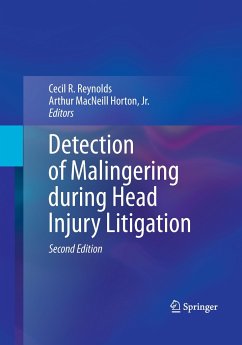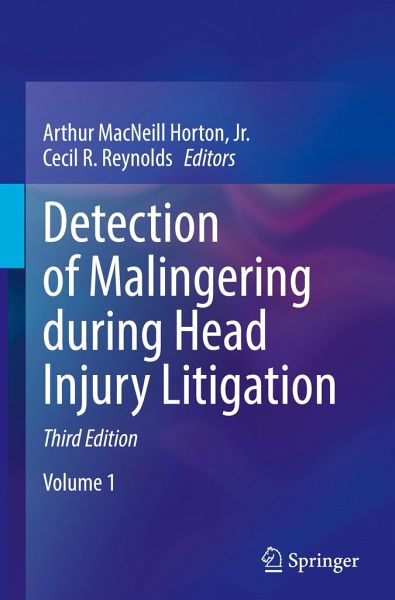
Detection of Malingering during Head Injury Litigation

PAYBACK Punkte
28 °P sammeln!
Expanding both the conceptual and clinical knowledge base on the subject, the Third Edition of Detection of Malingering during Head Injury Litigation offers the latest detection tools and techniques for veteran and novice alike. Increased public awareness of traumatic brain injuries has fueled a number of significant developments: on the one hand, more funding and more research related to these injuries and their resulting deficits; on the other, the possibility of higher stakes in personal injury suits-and more reasons for individuals to feign injury.As in its earlier editions, this practical...
Expanding both the conceptual and clinical knowledge base on the subject, the Third Edition of Detection of Malingering during Head Injury Litigation offers the latest detection tools and techniques for veteran and novice alike. Increased public awareness of traumatic brain injuries has fueled a number of significant developments: on the one hand, more funding and more research related to these injuries and their resulting deficits; on the other, the possibility of higher stakes in personal injury suits-and more reasons for individuals to feign injury.
As in its earlier editions, this practical revision demonstrates how to combine clinical expertise, carefully-gathered data, and the use of actuarial models as well as common sense in making sound evaluations and reducing ambiguous results. The book navigates the reader through the many caveats that come with the job, beginning with the scenario that an individual may be malingering despite having an actual brain injury.Among the updated features:
Specific chapters on malingering on the Word Memory Test (WMT), Test of Malingered Memory (TOMM) MMPI-2, MMPI-RF and MMPI-3;Detailed information regarding performance on performance validity tests in the domain of executive functioning and memory, Guidelines for explaining performance and symptom validity testing to the trier of fact;Chapters on mild TBI in children in head injury litigation, cultural concerns and ethical issues in the context of head injury litigation.
As in its earlier editions, this practical revision demonstrates how to combine clinical expertise, carefully-gathered data, and the use of actuarial models as well as common sense in making sound evaluations and reducing ambiguous results. The book navigates the reader through the many caveats that come with the job, beginning with the scenario that an individual may be malingering despite having an actual brain injury.Among the updated features:
Specific chapters on malingering on the Word Memory Test (WMT), Test of Malingered Memory (TOMM) MMPI-2, MMPI-RF and MMPI-3;Detailed information regarding performance on performance validity tests in the domain of executive functioning and memory, Guidelines for explaining performance and symptom validity testing to the trier of fact;Chapters on mild TBI in children in head injury litigation, cultural concerns and ethical issues in the context of head injury litigation.




